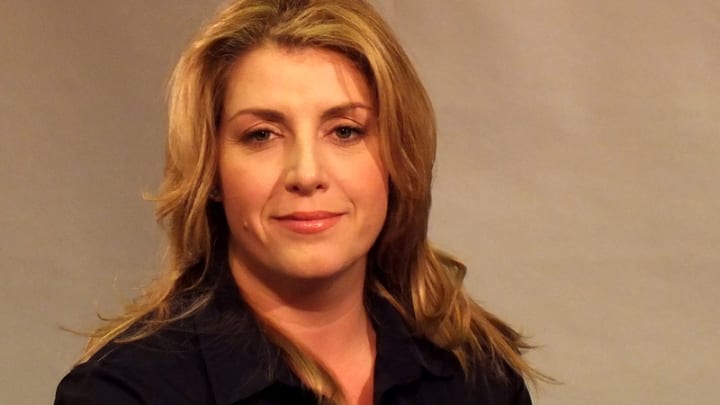
LONDON — Wednesday afternoon, Secretary of State for International Development Penny Mordaunt will give a speech at the All Party Parliamentary Group on Disability, outlining her goals for the United Kingdom’s Department for International Development’s focus on disability and inclusion. Three months into her role as head of DFID, Mordaunt has made disability a firm focus of U.K. aid. The upcoming disability summit in London this July aims to bring together the private sector, government, technology companies, multilateral development organizations, and NGOs to raise funds for disability-inclusive development, with large contributions expected from key players such as the World Bank.
Still, it remains unclear how Mordaunt’s focus on disability will manifest in DFID’s development programs, or how she will raise the profile of disability inclusion as a cross-cutting and neglected issue on the international stage. Her emphasis on improving efforts to collect data on disability, and to take stock of the problem’s magnitude, is a springboard for concrete initiatives. But what next?
Mordaunt to announce details of Global Disability Summit
United Kingdom Secretary of State for International Development Penny Mordaunt is set to make two announcements on disability and inclusion on Wednesday, with a focus on the importance of technology and data, as the issue emerges as a priority of her leadership agenda.
For one, DFID’s disability framework, last revised in 2015, is due an update. Others wonder whether the new push for disability inclusion will mean DFID will, for the first time, support national disability benefit programs in poor communities. Data shows that in Asia and the Pacific, less than 10 percent of disabled people have access to disability benefits, with access in Africa thought to be less than 4 percent.
Mordaunt spoke to Devex about her plans for putting disability at the center of U.K. aid, how she sees disability cutting across the 2030 Sustainable Development Agenda, and how disability fits into DFID’s other priorities, namely poverty reduction. The conversation has been edited for length.
Why is DFID tackling disability now?
Globally, it is estimated that 1 billion people have a disability. That’s more than 1 in 8 of us. And 80 percent of those people live in developing countries.
All too often, people with disabilities are the most discriminated against in society, and suffer appalling abuse, violence and indignity; and all too often, they are simply never counted at all.
People with disabilities should not be excluded from development and humanitarian efforts, or miss out on opportunities and experiences that are the right of every person. That’s why my department is striving to unlock the enormous potential of people with disabilities, so they can thrive.
What is the relationship between tackling disability and poverty reduction?
We simply cannot end poverty without including people with disabilities.
We know that in the developing world if you live in poverty, you are more likely to have a disability, and if you have a disability, you are more likely to live in poverty.
By breaking this vicious cycle, we all benefit from a more prosperous, safer, fairer world.
How do you view the importance of disability programming in the context of the Sustainable Development Goals? In what ways is disability a "cross-cutting" issue?
We will not meet the collective promise we made when we signed up to the Sustainable Development Goals unless we ensure we are including people with disabilities. Delivering programs that focus specifically on disability inclusion is one part of this, but if we are really going to succeed, we must look beyond disability as a single, isolated issue.
We must, while making sure people with disabilities are at the front and center, start breaking down the barriers that make programs, policies, and societies inaccessible so everyone can benefit.
Can you discuss the challenge of achieving value for money in disability programs? Which DFID partners and programs are hitting or exceeding the mark?
“Programs that are hitting the mark, and really delivering for people with disabilities are those that plan for inclusion from the start, and that is what I want to see more of.”
—Value for money is about maximizing the impact of every pound spent to improve people’s lives. But we will not achieve the best possible impact without taking an inclusive approach to value for money, ensuring no one, including people with disabilities, gets left behind.
Programs that are hitting the mark, and really delivering for people with disabilities are those that plan for inclusion from the start, and that is what I want to see more of. For example, through our education program in opposition held areas of Syria, DFID is pioneering the use of new assessment tools to help meet the needs of children with disabilities in some of the schools that receive U.K. support.
Why is disability especially crucial to DFID's work on women and girls?
In too many countries, women and girls with disabilities experience double discrimination, marginalized for their disability as well as their gender. I am proud of my department’s work to improve the lives of women and girls with disabilities. For example, DFID supports female-led disability organizations to advocate for their rights. And through the Girls Education Challenge, DFID has supported over 40,000 girls with disabilities to go to school.
How would you like to see current DFID programming related to disability get even stronger?
“I want to see DFID continue to work with all of our civil society, multilateral, and private sector partners to keep disability at the front of our agenda.”
—We’ve made a good start on disability-inclusive programming, but collectively, we are starting from a low base. I want to see DFID continue to work with all of our civil society, multilateral, and private sector partners to keep disability at the front of our agenda. Through our dedicated disability programming, we are starting to see good progress.
But we must continue to increase focus on disability inclusion in all our programming. We must also get better at collecting data so we can monitor how we are supporting people with disabilities. I recently attended the World Bank meetings in Washington and called for the collection of better data across World Bank programs so we can help the most marginalized fulfil their potential.
I look forward to the bank making high level commitments on disability at the Global Disability Summit in London this year.
In what ways does DFID plan to raise the profile of tackling disability in the international community? What partnerships or alliances do you see as crucial for moving forward?
One of my first announcements when I became international development secretary was that the U.K. will host a Global Disability Summit to galvanize the global effort to address disability inclusion in the poorest countries in the world, and act as the starting point for major change on this neglected issue.
We are co-hosting the summit with the International Disability Alliance to ensure people with disabilities are at the heart of planning and delivery. I am delighted the government of Kenya has agreed to co-host with us as well.
As well as showcasing best practice, the summit will generate robust commitments from the governments of developing countries, donors, civil society, foundations, and the private sector.
Update, March 7: This story was updated to clarify the upcoming date of the Global Disability Summit




